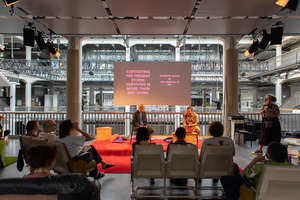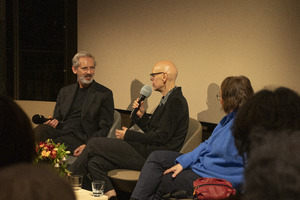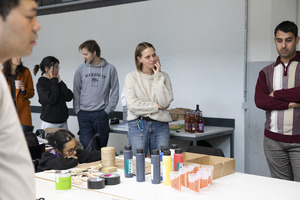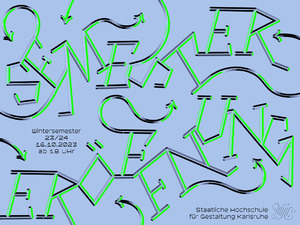Alistair Hudson
| Name | Alistair Hudson |
8 Inhalte
- Seite 1 von 1
Shiftings Paradigms Symposium 2024
- Titel
- Shiftings Paradigms Symposium 2024
- Titel (en)
- Shiftings Paradigms Symposium 2024
- Untertitel
- 1. gemeinsames Symposium zu den Postgradualen Programmen von HfG Karlsruhe und ZKM
- Untertitel des Projekts/Werks (en)
- 1st symposium on the postgraduate programs by HfG Karlsruhe and ZKM
- Beschreibung (de)
- Die Staatliche Hochschule für Gestaltung und das Zentrum für Kunst und Medien in Karlsruhe wurden in den 1990er Jahren von Gründungsdirektor Heinrich Klotz als Orte einer zeitgemäßen, auf die Neuen Medien gerichteten Forschung konzipiert. Sie bieten in ihrer Kombination von Hochschule und Kulturinstitution ausgezeichnete Vorbedingungen für eine Vernetzung künstlerischer und wissenschaftlicher Ansätze, für die es in Deutschland allerdings noch veränderte Rahmenbedingungen braucht.
Ein übergreifendes postgraduales Programm sollte interdisziplinäre Expertise versammeln und nutzen, um die Beziehungen von Kunst, Theorie und Gestaltung neu auszuloten und auf diese Weise an die wegweisende Gründungsidee von HfG und ZKM anzuknüpfen. Es sollte zugleich auf einen größeren Paradigmenwechsel antworten, der sich in Kunst und Kultur wie auch im wissenschaftlichen Bereich zu vollziehen scheint und der sich einerseits in Legitimationskrisen, andererseits in neuen und kreativen Formen der Recherche und Produktion von Wissen äußert. Die HfG Karlsruhe nimmt die Diagnose zum Anlass, um hybride Formate der Forschung neu zu konzipieren und auch die Funktion wissenschaftlicher Promotionen zu befragen.
Zur Vorstellung und Diskussion dieser programmatischen Überlegungen veranstaltete die HfG in Kooperation mit dem ZKM Karlsruhe am 5. und 6. Dezember 2024 ein erstes Symposium mit internationalen Gästen, das darauf abzielt, Räume und Ideen für eine sich transformierende Forschungspraxis zu entwerfen.
In vier Panels performten und diskutierten unter anderem die französische Wissenschaftshistorikerin und -philosophin Bernadette Bensaude-Vincent, der Professor für Kunstwissenschaft und Medientheorie Matthias Bruhn, die Professorin für Time Based Media und Performance Filipa César, die Szenografin und stellvertretende HfG-Rektorin Constanze Fischbeck, der ZKM-Direktor Alistair Hudson, die Künstlerin und Professorin für Code and Image Susanne Kriemann, der Professor der ADBK München Armin Linke, die Leiterin des ZKM-Hertzlabs Tina Lorenz, die Künstlerin, Kuratorin und Mitglied des Raqs Media Collectives Monica Narula, der Professor für kritische Theorie und Medienphilosophie Simon Sheikh, die Performancekünstlerin und Aktivistin Joy Mariama Smith, die Professorin für Design Füsun Türetken und die Professorin für Digitale Ästhetik Nina Zschocke mit weiteren Expertinnen und Experten, dem Publikum sowie den Angehörigen beider Häuser.
- Die Staatliche Hochschule für Gestaltung und das Zentrum für Kunst und Medien in Karlsruhe wurden in den 1990er Jahren von Gründungsdirektor Heinrich Klotz als Orte einer zeitgemäßen, auf die Neuen Medien gerichteten Forschung konzipiert. Sie bieten in ihrer Kombination von Hochschule und Kulturinstitution ausgezeichnete Vorbedingungen für eine Vernetzung künstlerischer und wissenschaftlicher Ansätze, für die es in Deutschland allerdings noch veränderte Rahmenbedingungen braucht.
- Beschreibung (en)
- The Staatliche Hochschule für Gestaltung (HfG) Karlsruhe and the Center for Art and Media in Karlsruhe (ZKM) were conceived in the 1990s by founding director Heinrich Klotz as places for contemporary research focused on new media. With their combination of university and cultural institution, they offer excellent preconditions for the networking of artistic and scientific approaches, for which, however, a different framework is still needed in Germany.
An overarching postgraduate program was intended to bring together and utilize interdisciplinary expertise in order to explore the relationships between art, theory and design in a new way, thus building on the pioneering founding idea of the HfG and ZKM. At the same time, it is intended to respond to a larger paradigm shift that seems to be taking place in art and culture as well as in the scientific field and which is expressed on the one hand in crises of legitimization and on the other in new and creative forms of research and production of knowledge. The HfG Karlsruhe was taking this diagnosis as an opportunity to redesign hybrid formats of research and also to question the function of academic doctorates.
To present and discuss these programmatic considerations, the HfG organized a first symposium with international guests in cooperation with the ZKM Karlsruhe on 5 and 6 December 2024, which aims to design spaces and ideas for a transforming research practice.
In four panels, the French historian and philosopher of science Bernadette Bensaude-Vincent, the professor of art studies and media theory Matthias Bruhn, the professor of time-based media and performance Filipa César, the scenographer and deputy HfG rector Constanze Fischbeck, the ZKM director Alistair Hudson, the artist and professor of code and image Susanne Kriemann, ADBK Munich Professor Armin Linke, ZKM-Hertzlab Director Tina Lorenz, artist, curator and member of the Raqs Media Collective Monica Narula, Professor of Critical Theory and Media Philosophy Simon Sheikh, performance artist and activist Joy Mariama Smith, Professor for Design Füsun Türetken and Professor of Digital Aesthetics Nina Zschocke discussed with other experts, the audience and members of both institutions.
- The Staatliche Hochschule für Gestaltung (HfG) Karlsruhe and the Center for Art and Media in Karlsruhe (ZKM) were conceived in the 1990s by founding director Heinrich Klotz as places for contemporary research focused on new media. With their combination of university and cultural institution, they offer excellent preconditions for the networking of artistic and scientific approaches, for which, however, a different framework is still needed in Germany.
- Typ des Projekts/Werks
- Schlagworte
- Datierung
- 05.12.2024 - 06.12.2024
- Mitwirkende
- Dank an
- Ort: Institution
- Ort
- Lichthof 3 (HfG), Useum (ZKM)
- Stadt
- Land
- Beteiligte Institution(en)
- Auftrag durch
- Rektorat
- Titel
- Shiftings Paradigms Symposium 2024
- Importiert am
- 05.01.2026
- Übergeordnete Sets
- 1
- Set enthält
- 6 0
Artists’ Television in the 80s: A Critique of Mass Media
- Titel
- Artists’ Television in the 80s: A Critique of Mass Media
- Titel (en)
- Artists’ Television in the 80s: A Critique of Mass Media
- Autor/in
- Beschreibung (de)
- Der Vortrag von Kathy Rae Huffman taucht tief in die faszinierende Geschichte des experimentellen Kabelfernsehens der 1980er Jahre ein. Im Zentrum stehen dabei die Produktionen von Künstler:innen am Long Beach Museum of Art (LBMA) – einen Hotspot für Medienkunst, der seiner Zeit weit voraus war. Huffman gewährt einen seltenen Einblick in das umfangreiche Videoarchiv des Museums, das heute vom renommierten Getty Research Institute in Los Angeles verwaltet wird. Über 5000 Videobänder – viele davon kaum jemals öffentlich gezeigt – dokumentieren eine Ära künstlerischer Freiheit und technologischer Innovation.
Als damalige Chefkuratorin des LBMA und Produzentin der visionären Kabelfernsehserie »Shared Realities« (1983–84) war Huffman selbst maßgeblich an der Gestaltung dieses außergewöhnlichen Kapitels der Medienkunst beteiligt. Ihr Vortrag bringt Archivschätze ans Licht und öffnet ein Fenster in eine kreative Pionierzeit, die noch heute nachhallt.
- Der Vortrag von Kathy Rae Huffman taucht tief in die faszinierende Geschichte des experimentellen Kabelfernsehens der 1980er Jahre ein. Im Zentrum stehen dabei die Produktionen von Künstler:innen am Long Beach Museum of Art (LBMA) – einen Hotspot für Medienkunst, der seiner Zeit weit voraus war. Huffman gewährt einen seltenen Einblick in das umfangreiche Videoarchiv des Museums, das heute vom renommierten Getty Research Institute in Los Angeles verwaltet wird. Über 5000 Videobänder – viele davon kaum jemals öffentlich gezeigt – dokumentieren eine Ära künstlerischer Freiheit und technologischer Innovation.
- Beschreibung (en)
- Kathy Rae Huffman's talk delves into the fascinating history of experimental cable television in the 1980s. At its center are the groundbreaking productions by artists at the Long Beach Museum of Art (LBMA)—a hub for media art that was well ahead of its time. Huffman offers a rare glimpse into the museum’s extensive video archive, now housed at the renowned Getty Research Institute in Los Angeles. Over 5,000 video tapes – many of which have rarely been shown publicly – document an era of artistic freedom and technological innovation.
As chief curator of LBMA from 1979 to 1984 and executive producer of the visionary cable TV series »Shared Realities« (1983–84), Huffman played a key role in shaping this extraordinary chapter in media art history. Her lecture brings archival treasures to light and opens a window into a pioneering creative era that continues to resonate today.
- Kathy Rae Huffman's talk delves into the fascinating history of experimental cable television in the 1980s. At its center are the groundbreaking productions by artists at the Long Beach Museum of Art (LBMA)—a hub for media art that was well ahead of its time. Huffman offers a rare glimpse into the museum’s extensive video archive, now housed at the renowned Getty Research Institute in Los Angeles. Over 5,000 video tapes – many of which have rarely been shown publicly – document an era of artistic freedom and technological innovation.
- Typ des Projekts/Werks
- Mitwirkende
- Ort: Institution
- Titel
- Artists’ Television in the 80s: A Critique of Mass Media
- Importiert am
- 13.05.2025
- Übergeordnete Sets
- 1
- Set enthält
- 0 0
Thinking inside out
- Titel
- Thinking inside out
- Titel (en)
- Thinking inside out
- Untertitel
- ZKM & HfG Gesprächsreihe
- Untertitel des Projekts/Werks (en)
- HfG & ZKM Talk Series
- Autor/in
- Beschreibung (de)
- In der Vortragsreihe »thinking inside out« laden das ZKM und die HfG Karlsruhe dazu ein, den Blick über vertraute Grenzen hinaus zu wagen. Internationale Stimmen aus Philosophie, Literatur und Kunst treffen hier auf Studierende, Forschende, Kulturschaffende und interessierte Bürger:innen – für inspirierende Begegnungen, unerwartete Perspektiven und offene Diskussionen.
- Beschreibung (en)
- As part of the lecture series »thinking inside out«, ZKM and HfG Karlsruhe invite audiences to look beyond familiar boundaries. International voices from philosophy, literature, and the arts come together with students, researchers, cultural practitioners, and engaged members of the public—for inspiring encounters, unexpected perspectives, and open dialogue.
- Typ des Projekts/Werks
- Mitwirkende
- Ort: Institution
- Titel
- Thinking inside out
- Importiert am
- 13.05.2025
- Übergeordnete Sets
- 1
- Set enthält
- 1 0
CONTESTING THE PRESENT STORM: SURVIVING IS MORE THAN NOT DYING
- Titel
- CONTESTING THE PRESENT STORM: SURVIVING IS MORE THAN NOT DYING
- Titel (en)
- CONTESTING THE PRESENT STORM: SURVIVING IS MORE THAN NOT DYING
- Untertitel des Projekts/Werks (en)
- Aesthetic praxis and the defense of life
- Autor/in
- Beschreibung (en)
- To address today’s political conjunctures, it becomes crucial to study the link between extractivism and warfare as pillars of capitalist democracy and global colonialism. The Zapatista Army of National Liberation (EZLN) has been warning us about the present storm, underlining how the global territorial reordering between imperialist powers has turned into a total war threatening all forms of life: the living, the dead, and the non-dead. The present storm carries a monster of multiple heads, the capitalist hydra – as they name multilayered systematic oppression and exploitation with a voracious ecocidal drive. The Zapatistas have also warned us that in the face of this growing threat, “there will be no landscape left to account for.”
This talk will debate some characteristics of the present storm by analyzing contemporary mechanisms that are renewing the systematic forms of global oppression and exploitation in the context of Mexico. To set the context, it will focus on the 2019 infrastructural National Development Plan, the interrelated impacts, and characteristics of involved actors: military, paramilitary, organized crime, national and transnational corporations. The implementation of these projects carries a documented violent dispossession of communal and agrarian territories, targeted incarceration of land defenders, disappearances and murders, displacement and dissolution of communities, destruction of cultural artifacts and archeological sites, erosion of vital ecosystems, scorched atmospheres, and the risk of irreversible ecological consequences.
It will zoom into the present multilayered critical scenario of the south and southeast Mexican regions, setting grounds for introducing a few keys to the historical indigenous and non-indigenous resistance in the struggle for self-determination and autonomy at the heart of an aesthetic praxis. **/
David Muñoz-Alcántara is a guest professor in Media Art at the HfG. Alistair Hudson is the Scientific-Artistic Chairman of the ZKM.
- To address today’s political conjunctures, it becomes crucial to study the link between extractivism and warfare as pillars of capitalist democracy and global colonialism. The Zapatista Army of National Liberation (EZLN) has been warning us about the present storm, underlining how the global territorial reordering between imperialist powers has turned into a total war threatening all forms of life: the living, the dead, and the non-dead. The present storm carries a monster of multiple heads, the capitalist hydra – as they name multilayered systematic oppression and exploitation with a voracious ecocidal drive. The Zapatistas have also warned us that in the face of this growing threat, “there will be no landscape left to account for.”
- Typ des Projekts/Werks
- Datierung
- 19.06.2024
- Ort: Institution
- Ort
- Lichtbrücke
- Beteiligte Institution(en)
- Titel
- CONTESTING THE PRESENT STORM: SURVIVING IS MORE THAN NOT DYING
- Importiert am
- 24.02.2025
- Übergeordnete Sets
- 1
- Set enthält
- 0 11
Vom Nutzen der Kunst
- Titel
- Vom Nutzen der Kunst
- Titel (en)
- On the benefits of art
- Autor/in
- Beschreibung (de)
- In der gemeinsamen Gesprächsreihe "Vom Nutzen der Kunst" von ZKM und HfG, laden wir internationale Gäste aus Philosophie, Literatur und Kunst zum offenen Austausch mit den Hochschulangehörigen, den Mitarbeitenden des ZKM und der Karlsruher Bevölkerung ein.
- Beschreibung (en)
- In the joint series of talks between ZKM and HfG, we invite international guests from the fields of philosophy, literature and art to an open exchange with members of the university, ZKM staff and the people of Karlsruhe.
- Typ des Projekts/Werks
- Schlagworte
- Datierung
- 16.11.2023
- Ort: Institution
- Ort
- Media Lounge
- Stadt
- Land
- Titel
- Vom Nutzen der Kunst
- Importiert am
- 28.11.2023
- Übergeordnete Sets
- 1
- Set enthält
- 2 0
Handeln mit Zwecken. Künste im 21. Jahrhundert
- Titel
- Handeln mit Zwecken. Künste im 21. Jahrhundert
- Titel (en)
- On the benefits of art - with philosopher and artist Judith Siegmund ZKM & HfG Talk Series
- Untertitel
- mit Philosophin und Künstlerin Judith Siegmund ZKM & HfG Gesprächsreihe
- Autor/in
- Beschreibung (de)
- In der gemeinsamen Gesprächsreihe "Vom Nutzen der Kunst" von ZKM und HfG, laden wir internationale Gäste aus Philosophie, Literatur und Kunst zum offenen Austausch mit den Hochschulangehörigen, den Mitarbeitenden des ZKM und der Karlsruher Bevölkerung ein. Zum Auftakt sprechen Alistair Hudson und Constanze Fischbeck mit der Philosophin und Künstlerin Judith Siegmund.
Der Titel des Vortrags an diesem Abend wird sein: "Handeln mit Zwecken. Künste im 21. Jahrhundert“
- In der gemeinsamen Gesprächsreihe "Vom Nutzen der Kunst" von ZKM und HfG, laden wir internationale Gäste aus Philosophie, Literatur und Kunst zum offenen Austausch mit den Hochschulangehörigen, den Mitarbeitenden des ZKM und der Karlsruher Bevölkerung ein. Zum Auftakt sprechen Alistair Hudson und Constanze Fischbeck mit der Philosophin und Künstlerin Judith Siegmund.
- Beschreibung (en)
- In the joint series of talks between ZKM and HfG, we invite international guests from the fields of philosophy, literature and art to an open exchange with members of the university, ZKM staff and the people of Karlsruhe. To kick things off, Alistair Hudson and Constanze Fischbeck will be talking with the philosopher and artist Judith Siegmund.
Judith Siegmund is a professor of philosophical aesthetics at the Zurich University of the Arts. In her book »Zweck und Zweckfreiheit« (2019), she questions the demand for purposelessness in artistic creation that emerged in 20th-century aesthetic theory with reference to Kant. Instead, she starts from the assumption that aesthetic theory must prove adequate to its object.
- In the joint series of talks between ZKM and HfG, we invite international guests from the fields of philosophy, literature and art to an open exchange with members of the university, ZKM staff and the people of Karlsruhe. To kick things off, Alistair Hudson and Constanze Fischbeck will be talking with the philosopher and artist Judith Siegmund.
- Typ des Projekts/Werks
- Schlagworte
- Datierung
- 16.11.2023
- Mitwirkende
- Ort: Institution
- Ort
- ZKM Medialounge
- Stadt
- Land
- Beteiligte Institution(en)
- Internetlinks
- Titel
- Handeln mit Zwecken. Künste im 21. Jahrhundert
- Importiert am
- 23.11.2023
- Übergeordnete Sets
- 1
- Set enthält
- 0 18
PRESENT TENSE Working in Critical Times
- Titel
- PRESENT TENSE Working in Critical Times
- Titel (en)
- PRESENT TENSE Working in Critical Times
- Untertitel
- Symposium des Kunstbüros der Kunststiftung Baden-Württemberg
- Autor/in
- Beschreibung (de)
- „Present Tense” beschäftigt sich mit unserer unmittelbaren Gegenwart: Wir leben in einer komplexen, krisenhaften Zeit, in der die Überlagerung von Klima- und Energiekrise, Postpandemie, Prekarität und Konkurrenz, gesellschaftlicher Radikalisierung bis hin zu näher rückenden Kriegen bereits jetzt gravierende Auswirkungen auf unser Leben und Arbeiten hat. Die Anspannung steigt, wir stehen vor dringlichen gesamtgesellschaftlichen Aufgaben und bewegen uns zugleich in Richtung eines Zustands chronischer Erschöpfung. Das etablierte Kunstfeld und die künstlerische und kulturelle Produktion sind davon nicht ausgenommen. Mit Künstler:innen, Kurator:innen und anderen Expert:innen des kulturellen Feldes möchten wir den Blick auf die aktuelle künstlerische Produktion und Ausstellungspraxis richten und die Frage nach möglichen (Zukunfts-)perspektiven für das Kunstfeld diskutieren:
Welche gesellschaftliche Rolle können und müssen Kunst und ihre Produzent:innen in einer sich radikal verändernden Welt einnehmen? Wie können Kunst- und Kulturinstitutionen zu Orten aktiver gesellschaftlicher Transformation werden? Was bedeutet es, eine (ökologisch wie sozial) nachhaltige künstlerische und institutionelle Praxis in der digitalen Gegenwart zu entwickeln? Welche neuen Gemeinschaften brauchen wir, gerade im Hinblick auf die zunehmende gesellschaftliche Spaltung und Radikalisierung? Offensichtlich führt die krisenhafte Gegenwart u. a. dazu, dass sich Menschen nach autoritären Figuren und Programmen sehen – eine Aufgabe von Kunst und Kultur könnte es sein, andere, freiere Konzepte von Zukunft zu entwerfen.
Auch das Konzept der Fürsorge in der künstlerischen und kuratorischen Praxis wird Thema der Veranstaltung sein. Teil des Symposiums sind neben Vorträgen künstlerische Workshops, Interventionen und Performances, die wir als gleichwertige Formen der Wissensproduktion und -vermittlung begreifen.
Mit Beiträgen von Gin Bahc, Sascia Bailer, Constanze Fischbeck, Sina Hensel, Alistair Hudson, Anne Duk Hee Jordan, Valentina Karga, Matriarchale Volksküche, Jacob Ott und Dorothee Richter.
- „Present Tense” beschäftigt sich mit unserer unmittelbaren Gegenwart: Wir leben in einer komplexen, krisenhaften Zeit, in der die Überlagerung von Klima- und Energiekrise, Postpandemie, Prekarität und Konkurrenz, gesellschaftlicher Radikalisierung bis hin zu näher rückenden Kriegen bereits jetzt gravierende Auswirkungen auf unser Leben und Arbeiten hat. Die Anspannung steigt, wir stehen vor dringlichen gesamtgesellschaftlichen Aufgaben und bewegen uns zugleich in Richtung eines Zustands chronischer Erschöpfung. Das etablierte Kunstfeld und die künstlerische und kulturelle Produktion sind davon nicht ausgenommen. Mit Künstler:innen, Kurator:innen und anderen Expert:innen des kulturellen Feldes möchten wir den Blick auf die aktuelle künstlerische Produktion und Ausstellungspraxis richten und die Frage nach möglichen (Zukunfts-)perspektiven für das Kunstfeld diskutieren:
- Beschreibung (en)
- „Present Tense” concerns itself with our immediate present: We live in a complex, crisis-filled age in which the overlapping of climate and energy crisis, post-pandemic times, precarity, social radicalisation and even impending wars already govern our lives and work. Tension is rising, we are faced with imperative responsibilities for society as a whole and are, at the same time, moving towards a state of chronic exhaustion. There is no exception for the field of arts and artistic and cultural production.
Together with artists, curators and other experts from the cultural field, we would like to examine current artistic productions and exhibition practices and discuss possibilities for the (future) perspectives of the arts. Which roles within society can and must art and its producers embrace in a radically changing world? How can art and cultural institutions become venues of active social transformation? What does it mean to develop an (ecologically as well as socially) sustainable artistic and institutional practice in the digital present? The concept of care within artistic and curatorial practices will be a topic of the event as well.
What new relationships do we need, especially in view of intensifying social division and radicalisation? Obviously, the crisis-filled present among other things leads to people looking to authoritarian figures and programmes – one of the tasks for art and culture could be to design other, more independent and free concepts of the future.
In addition to lectures and panels, the symposium will include artistic workshops, interventions and performances, which are also forms of knowledge production and dissemination that we feel to be of equal importance.
With contributions from Gin Bahc, Sascia Bailer, Constanze Fischbeck, Sina Hensel, Alistair Hudson, Anne Duk Hee Jordan, Valentina Karga, Matriarchale Volksküche, Jacob Ott and Dorothee Richter
- „Present Tense” concerns itself with our immediate present: We live in a complex, crisis-filled age in which the overlapping of climate and energy crisis, post-pandemic times, precarity, social radicalisation and even impending wars already govern our lives and work. Tension is rising, we are faced with imperative responsibilities for society as a whole and are, at the same time, moving towards a state of chronic exhaustion. There is no exception for the field of arts and artistic and cultural production.
- Typ des Projekts/Werks
- Schlagworte
- Datierung
- 26.10.2023 - 28.10.2023
- Mitwirkende
- Sprache
- Ort: Institution
- Ort
- Lichthof, R.112
- Stadt
- Land
- Beteiligte Institution(en)
- Internetlinks
- Titel
- PRESENT TENSE Working in Critical Times
- Semester
- Importiert am
- 06.11.2023
- Übergeordnete Sets
- 1
- Set enthält
- 0 146
Semestereröffnung Wintersemester 2023/2024
- Titel
- Semestereröffnung Wintersemester 2023/2024
- Titel (en)
- Opening Winter Semester 2023/2024
- Beschreibung (de)
- Die Hochschule heißt die Erstsemester, Studierenden und Angehörigen der HfG Karlsruhe sowie Gäste, Freund:innen und Fördernde zum Beginn des Wintersemesters 2023/2024 in einer festlichen Semestereröffnung willkommen, die in diesem Jahr am Montag, 16. Oktober 2023 im Lichthof stattfindet.
Programm:
ab 17:30 Bar und DJ-Set Finn Baygan
18:00-18:10 Eröffnung Prof. Constanze Fischbeck
18:10-18:15 Grußwort Alistair Hudson
18:15-18:20 Grußwort Prof. Dr. Rupert Vogel
18:25-18:35 Verabschiedung Mitarbeitende und Lehrende und Begrüßung der neuen Lehrenden durch Prof. Dr. Matthias Bruhn
18:40-18:50 Künstlerischer Beitrag von Finn Baygan
18:50-19:10 Diplomübergaben durch die Fachgruppen
19:10-19:20 Preisübergabe durch Bürgermeister Dr. Albert Käuflein mit Jana Renger & Guillermo Wilkins
19:20-19:25 AStA Beitrag
19:25-19:30 Danksagung durch Prof. Dr. Matthias Bruhn
19:30-20:30 Bar und DJ-Set Finn Baygan
20:30 Im Forum: Performance aaahhhnnndddiii
- Die Hochschule heißt die Erstsemester, Studierenden und Angehörigen der HfG Karlsruhe sowie Gäste, Freund:innen und Fördernde zum Beginn des Wintersemesters 2023/2024 in einer festlichen Semestereröffnung willkommen, die in diesem Jahr am Montag, 16. Oktober 2023 im Lichthof stattfindet.
- Beschreibung (en)
- The university welcomes the freshmen, students and members of the HfG Karlsruhe as well as guests, friends and supporters at the beginning of the winter semester 2023/2024 in a festive semester opening, which will take place this year on Monday, October 16, 2023 in the Lichthof.
Program:
from 17:30 Bar and DJ set Finn Baygan
18:00-18:10 Opening Prof. Constanze Fischbeck
18:10-18:15 Greeting Alistair Hudson
18:15-18:20 Greeting Prof. Dr. Rupert Vogel
18:25-18:35 Farewell to staff and lecturers and welcome to the new lecturers by Prof. Dr. Matthias Bruhn
18:40-18:50 Artistic contribution by Finn Baygan
18:50-19:10 Presentation of diplomas by the departments
19:10-19:20 Award ceremony by mayor Dr. Albert Käuflein with Jana Renger & Guillermo Wilkins
19:20-19:25 AStA Contribution
19:25-19:30 Acknowledgement by Prof. Dr. Matthias Bruhn
19:30-20:30 Bar and DJ-Set Finn Baygan
20:30 In the Forum: Performance aaahhhnnndddiii
- The university welcomes the freshmen, students and members of the HfG Karlsruhe as well as guests, friends and supporters at the beginning of the winter semester 2023/2024 in a festive semester opening, which will take place this year on Monday, October 16, 2023 in the Lichthof.
- Typ des Projekts/Werks
- Schlagworte
- Datierung
- 16.10.2023
- Mitwirkende
- Ort: Institution
- Ort
- Lichthof
- Stadt
- Land
- Beteiligte Institution(en)
- Internetlinks
- Titel
- Semestereröffnung Wintersemester 2023/2024
- Semester
- Importiert am
- 23.10.2023
- Übergeordnete Sets
- 1
- Set enthält
- 0 14



